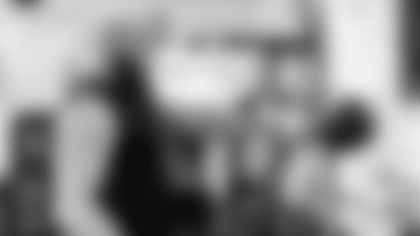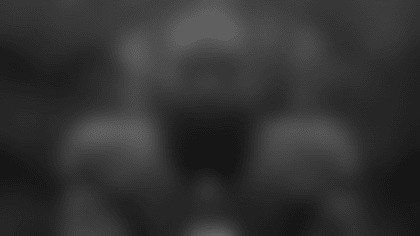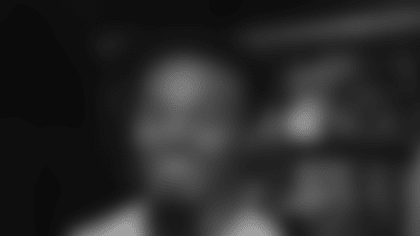Opening Remarks: "Most of you realize that we do this once a year, I try to paint a really broad picture of the status of the Eagles, the NFL, and try to answer any questions that you have, but also try to kind of have a perspective that you kind of get from months and months of an offseason. We are starting a new decade which is also rather interesting for any observer of the team and the league. So much has gone on in at least my full decade of ownership, with the team and the NFL and the business environment around this sport – it's kind of remarkable. And you guys are actually a large part of the equation as well because while there is so many changes going on with the game of football, in terms of the success with the Eagles – yeah, it's been an amazing decade with a lot of work still to do – but the business partners of the NFL, their models are changing dramatically, the broadcast models are extremely different now than they were at the beginning of the last decade. The people that cover us, the business models in many cases are broken, no fault of the people that are doing the work and the writing, but we all have to kind of work with and understand the models that are failing and the models that are succeeding, and we are in a digital world. And it is great for a sport that is so massively popular, to have increased distribution digitally, whether it's twittering about a player that goes down and you can see it in Thailand in about ten seconds. I'm one who believes that part of the popularity of the NFL which has dominated the sports world, especially in America over the last decade, has been because of the increase in distribution capability. It focuses on what is most popular, and gets it out there instantaneously, and that's driven the popularity. It feeds on itself so that the young generation now is growing up with instantaneous information and lots of fodder for discussion, and it's great, it's absolutely great. We need to both embrace the people that work for the business models that are not as effective, and figure out ways of keeping that closeness and relationship there, and at the same time embrace the new technology that travels the world in nanoseconds. So I'm happy to talk about all of that stuff and how the NFL and game has changed, and any specific questions as well. But I couldn't not bring that up because it is a new decade, you look back on what we've learned from the past decade, and the NFL and the Eagles locally have just had an amazing string of success and an increase of popularity, and it's something that has to be both managed, improved on and constantly evaluated and critiqued, and that's how you improve a business model. Anyway, open to questions obviously."
On whether he will be tweeting some time soon: "Probably my son and daughter will be tweeting faster than me, but you know it's funny, we started this facebook fanpage and the number of people involved in that just in a week, astronomical. (WR) Jeremy Maclin goes down yesterday, well if you're on a beach in Thailand you probably knew about it five seconds later. It's a new world out there and I think that it's all for the best. Sports team, we all grew up with a local connection with our local newspapers and with our local television stations and that's how we kind of fell in love with sports. And football particularly was the greatest TV sport, so we don't want to lose that capability of that relationship and we've got to find ways of working with the models that are not as quick and up to date as necessary and where the business models are not surviving."
On how soon the 18-game season will be implemented: "I think first of all that it's long overdue and one of the things that I've realized and it's been almost an embarrassment, is fans don't like the long preseason. The quality is not there, and I think you have to balance getting ready for a season, and two games I think with all of the training and offseason conditioning that goes on, is it perfect? No, but I think that the fans have spoken and they absolutely would rather see an 18-game regular season and a two-game preseason. I'm not really in favor of expanding the overall games, I think that we don't want to get like other sports where there are so many games and the physical wear and tear becomes a factor. It already is a factor, we're going to have to figure out both roster sizes, roster flexibility rules, lots of things like that, but I think that we have been slow to react and I hope that we can in a new collective bargaining agreement certainly go for that as soon as possible."
On having only two preseason games and whether that would lead to more injuries in the regular season: "We could be, but if you can adjust the flexibility of roster inclusion, and roster size questions and you're going to have to plan your roster. Maybe you focus slightly more on depth in certain areas, it's a matter of trying to intelligently plan your 53-man roster, and I think that the fans and players will embrace this in time, and I think that the fans will embrace it right away, because four preseason games is not much fun."
On what he considers a mistake in his mind when it comes to QB Michael Vick: "With Michael Vick, I just have to say, I've got to be the CEO of the team and also an employer of a player, for every player. You all heard from me when we signed him and how soul searching a decision it was, Michael Vick, the facts are very simple. I look at how he has been as a teammate – an extremely, extremely good teammate – spoken about I don't know if it has been written about, very supportive of his fellow teammates. I've actually spoken to many of our players about this because it was a concern of mine. I mentioned it when we signed him, I said that if it was going to be any problem in terms of him as a great teammate, that's a non-starter for me. We went through the things with other players who were not great teammates, and don't want to do that again. He's been a great teammate. Has he been excellent in the community? He's been the single best player I think in the first year of employment in this organization in the community. The types of communities that he speaks at and spends time with, these kids, they are very different than any of us sitting in this room right now. They understand to a large degree what he's trying to do and what crimes he's committed and how he's trying to make up for it. So that's a powerful voice and potential role model. He's done that better than expected in Philadelphia and elsewhere. That was also a prerequisite of giving Michael a second chance. Thirdly, and I think very importantly because it gets up brought up from time to time over the summer is I have to deal with the facts, I can't deal with people that are happy we signed Michael Vick, unhappy we signed Michael Vick, want to create a headline, want to discuss it in different ways, that's not me, I've got to just deal with the facts for all 53 players. When Michael had his birthday party, which was a mistake for him to be at, there were since four independent investigations of Michael's activities, so I was very anxious to hear from the NFL, from our own people, from the state of Virginia, from the probation people. And my own feeling, even though I'm supportive of Michael and how's he's been as a teammate and a community person for this team, if any of those four investigations have turned up any wrongdoing, there would have been no tolerance for that. Basically, I have to go from the position of those were the facts. I have a lot of respect for how in-depth the investigations are and the NFL is dispassionate. If you're going to commit any wrongdoing, they're going to both understand it, find out about it and level their form of justice. That's the world that I am in and I very firmly feel that, in our society, we've got to understand the difference between bringing an ex-offender into an organization and monitoring them and then being so quick to decide, not based on facts, that they don't deserve that second chance you gave them versus understand where they're coming from, what they've been doing for the past year with your organization and in the league. You may or may not like what they have committed, or feel that they didn't serve enough time or served too much time. Those are separate issues. What you don't want in our society, I don't think as an employer, is being so acutely sensitive that an err in judgment, without any wrongdoing, would cause them to end their career. That's what I feel about it."
On whether he feels Vick has been an agent of change: "Yeah, I do, but that's a hard thing to measure because these are kids you're dealing with that you hope he's influencing. From all the feedback I get and the interactions he's had, it's a unique case of somebody who has done some really bad things being able to explain himself and being able to explain, not just with animal cruelty, but the difficulty of leaving an environment that you grew up with and trying to make a success of yourself after a tremendous failure. That's a message of hope and a message of redemption that does hit home for kids that are from real disadvantaged communities. I don't know that you can measure today, August 2010, that there's tremendous impetus for social change from that, but that gets multiplied over time. He's going to have a lot of time to keep impacting kids. That's rare for a player. We send our players out in the community. They're very busy and exhausted mentally and physically. On Tuesdays they get to spend some time out in the community. It's hard to have the impact of a Michael Vick because they didn't go through that experience. Kids can embrace something that's occurred that's been so negative and a path wrongly taken. They can understand that because they've been through a lot of those kind of things in their own community. It's a unique opportunity and he's, I think, made the most of it for the past year. I expect him to continue to be real proactive. We won't tolerate wrongdoing. I don't want people to think that's on the agenda of there's more tolerance; there's not. You don't want to be so quick to judge when you're dealing with somebody. You've got to deal with the facts."
On the extra support measures for Vick that are going to be put intoeffect: "I don't want to go into the details of that because I think that's between the league and Michael Vick. When a player, you've seen it in other sports, comes from an environment where they're trying to satisfy some of the members of that environment that they grew up with and get labeled as no longer supportive of their old friends or their old family – it's not just the NFL – we've got to do a better job of both monitoring and supporting that player because that's a tough one. We in this room don't have to really go through that. But for a player to go back to his home environment, even if it's once or twice a year, with all those people that love him when he's up and hate him when he's down, it's something that I think, as a league, we will grow with. This is a good case. This is a good chance to support that. He's got to take advantage of that. He will be monitored and supported in that way. Obviously if he doesn't follow through with all of that, then he won't be playing football, but I think he will."
On him saying that there would be no third chance for Vick: "I feel that's exactly the sentiment. You have to decide, is that chance based on wrong doing or a lapse in judgment to attend a party where he had no wrongdoing. That's, I think for all of us an interesting question. Those that hated that we signed Michael Vick, or were very upset that we signed Michael Vick and believe me, I understand that completely, would probably be quicker to jump and say 'he showed lapse of judgment. That's a huge mistake. End of career.' I don't feel that way. I feel as human beings, that was a lapse of judgment. Nothing he did was factually creating any wrongdoing. He shouldn't have been there. But he was trying to appease some people from his old neighborhood and family. So, let's give support, let's not jump to judgment and let's deal with the facts. That's the best I think a CEO can do, an owner of an organization, or an employer. And again, these kids, they're from a very different environment and that's something that we should take up in sports in general. The recidivism rate in the United States is horrendous, 70%. We incarcerate, I think a higher percentage of our population than any country in the world. We have to find a better way and this is not to be made an example of, but we have to find a more human way of understanding what's creating some of the poor decisions. In this case, it was a lapse in judgment of a decision, there was no wrongdoing."
On whether he had any angst and second guessing before the facts came out about the birthday party: "I had angst about it, but I also felt a very definite philosophy on this. That if there was wrongdoing, there was no way we were going to continue with Michael and his career. I've been very clear about that. There's no question on that. So, it was just waiting on the facts to come in and I was glad that there were so many investigations. It was a very good support system we had in terms of all the investigations that were going on. I was totally comfortable with however it would play out, but I knew that there would be no tolerance for any wrongdoing."
On his stance on another lapse in judgment if there is no wrongdoing: "The support system he's being given, I guess you could say, on a more intense basis implies that he needs to not have those lapses in judgment like that. But that's, again, all the employees for any of the people you work for, work with and I work with, it's really about wrongdoing and that's really the bottom line. There are a lot of things you can do wrong and any of those would suffice to end the relationship."
On whether he thinks the chance he took on Vick will be worth it in the end: "It's a good question. I think the answer to that is at least a year away. I think we really need to see Michael Vick, a year later in great shape, able to hopefully contribute in a bigger way to the football team on one side and also a year more out to the community. I think that sort of legend or that analysis is left to be determined. Whatever it is, it is. But I think the message that we send to communities of hardship around the country and particularly black communities is one of hoping to offer support and redemption, not be criticizing the person who has already served time. I think it's important to lend that support. If they can't grab onto the support and run with it, and be great with it, then okay. But the message I'd like to give to players around the country, college players is the Eagles are an organization that will think it through. We'll make mistakes, but we'll think it through. We have a high-character team and he's been a high-character player on that team. That's an important part of it too."
On the process he went through when deciding to trade QB Donovan McNabb: "There was an evolution. One of the philosophies of the team, as I think I've iterated and you've all heard from us over and over is the importance of the quarterback position. We've always wanted to develop young quarterbacks, while we had good quarterbacks. That's not easy to do sometimes. In some cases, you market them and get a number two pick for A.J. (Feeley) that we got and you have success with other players that you bring in, like Jeff Garcia. But the philosophy is that it's a quarterback-based league. You have to develop young quarterbacks in their prime and the best way to do it if you can is to develop that player, pinpoint the player, develop him while you have the quality quarterback we had in Donovan. So, I think there was a natural evolution here. Kevin (Kolb) is more than ready to play. Donovan had a good season. There wasn't the feeling that we would drop off in any way, having a new quarterback there's a risk. There's obviously an unknown involved there, but there wasn't a sense that this is a drop-off situation. This was a perfect opportunity for the player youth and developing to take the reins of the team and maximize his capabilities. At the same time, you try to balance that with market value for the players you have and Donovan a year ago coming off the ACL (injury) maybe didn't have the league-wide value. This year he had a very good season and we had to explore what the value was. So, the thought was and I think, you know, along the philosophical lines we've talked about is develop a young quarterback and get some market value for Donovan, which we hoped to have two very good young players in that trade. Donovan, again, I guess I haven't even spoken about it, but the best quarterback I think the Eagles have ever had; classy, terrific in every way. He did not win a Super Bowl, but the franchise over the last 10 years as you know, five division championships, five appearances in the championship game in the NFC Super Bowl, a very extraordinary decade by any measure except for the lack of a Super Bowl championship. So, he's going to be back here some point as a legend, as the greatest quarterback in the history of the team. But I think the timing felt right to the decision-makers, (head coach) Andy (Reid) in particular whom was the final decision-maker just felt the timing was right to probably like Green Bay (Packers) did with (QB) Aaron (Rodgers) and (QB) Brett (Favre). It was the right timing to let the young quarterback really thrive and with market value coming back. So, we were able to get the value of a number one pick. Hopefully, two good young players and hopefully have a good young quarterback. If we don't, we'll be drafting more and more quarterbacks. But that really is the philosophy, and you hope to do it. If you picked wrong, you're going to be picking quarterbacks."
On feeling queasy that he traded McNabb to the Redskins: "I don't see it that way. We've never hesitated to trade and make the best trade that's best for the Eagles, honestly. This goes way back. It's how we got (LB) Jeremiah Trotter, for a trade with the (Dallas) Cowboys. We both blew our first round picks in that trade, but we got Trotter out of it. The Kevin Kolb trade, they gained a pass rusher who started to emerge last year. We gained what we hope is a franchise quarterback and (LB) Stewart Bradley and the ability to draft (TE Brent) Celek a round earlier where we thought we were going to lose him. So, if it's to our advantage, in this case the (Washington) Redskins had a good quarterback in Jason (Campbell), they're getting a very good quarterback in Donovan. They're also giving us two good young players in that trade, who should be with us hopefully for a long, long period of time. So, I don't see it that way. I'm happy that Donovan's in hopefully a good situation for him with a terrific coach in Mike Shanahan. But I don't see it as a negative. I see it as a positive. They were the ones who gave us the best offer and two years ago we made it to the championship game and Jason Campbell and the Redskins swept us. They can't do any better than that and hopefully we'll sweep them."
On how he differentiates between what's a lapse in judgment versus wrongdoing and who tells the players that the way they grew up is wrong: "That is such a large societal question. I mean, bullfighting is the number one sport in Spain besides soccer and if we had bullfighting in Philadelphia, you'd probably not support it. Every country and every area operates in its own context and we contract with people that make judgments over that and in this case the NFL and the Players Association. Those are the contracting parties and we abide by the collective bargaining agreement and there are no easy answers to the sort of anthropological analysis of how we understand what's right and what's wrong. That's a tough question and it's a good question, but I don't profess to have the answers there."
On Vick talking about the opportunity to start and whether he still wants to be with the Eagles: "I definitely feel he wants to be here and I definitely feel he wants to be a star starting quarterback in the NFL. If you come from where he did, number one pick in the draft and all the success and the highest salary player in the NFL, perennial Pro Bowler, you can't expect a sense of wanting to go back to that and improve. The one thing I've noticed about Michael that is very interesting is that I think he recognized coming from Atlanta that he didn't have all the quarterback skills. There were some weaknesses in his game even though he took the team to the Championship game and he has worked so hard on his weaknesses that it's great to see. I mean, the classroom he's been a star and with what he works on he's a star. So, I think if he can keep himself out of trouble he has a chance to be a star again in the NFL and I think hopefully we'll get the benefit of that this year in terms of how we utilize him."
On whether he knows if Vick had any interaction with Quanis Phillips the night of the shooting: "I don't know that whatsoever."
On how he knows what happened: "I'm just basing it on the investigations exactly that there was no wrongdoing. We've been over this already."
On the rumors that have not been clarified yet and whether the facts should be clarified: "The facts are that there was no wrongdoing. If obviously that's wrong, that will become apparent. You can only deal with the facts, that's all you can deal with. I can't sit here and deal with rumors, innuendos and all sorts of things. It's just not productive."
On only the small group of people that know the facts: "The people that did the investigations, they know the facts. So we base it on them. We're not the experts."
On whether he has a problem with Vick lobbying to go to another team during the offseason: "Well, I think that you want him to have the drive to be the best quarterback in the National Football League. If there's a part of him that thinks he's going to star for another team then, you know, bring them on and let's see what they're going to offer. There's no negative to that. I'd rather have a player think that he's going to – if you have a player that he thinks he's going to be a star quarterback for another team and another team feels he's going to be a star quarterback for them, we have asset value. So, there's nothing wrong with that. I want players to have that drive. I want Kevin Kolb to feel he's going to be the next young, great quarterback in the National Football League. You know, that's another thing that – and I'll keep answering anything you want here, but one of the things that's really been interesting over the last decade, the emergence of young quarterbacks in the NFL. We are in a very different situation now than we were in 2000, 2001 with Donovan. There are a lot of good, young quarterbacks in the league. Unfortunately, a lot of them are in the NFC. I think by many accounts, the very best, young quarterback is the one we play in the first week of the season. It's something that we've got to build a great defense for and we've got to have a very productive offense. As I look forward, that's a challenge because this is not a league with a scarcity of quarterbacks. Who are going to be the great ones? We'll see. Obviously (Saints QB) Drew (Brees) and (Packers QB) Aaron Rodgers and guys like that, they're all in the NFC. (Rams QB) Sam Bradford just got picked. Looks like he could be a phenomenal player, phenomenal player; NFC. The list goes on and on and on. So, the NFC is – both the East is daunting and the whole NFC is daunting. We've got to be the best we can be."
On whether everyone will be here on time next year and on whether the Super Bowl in Dallas doesn't start a war that may never end: "I think, you know, obviously I'm not allowed to talk about collective bargaining issues, but what I will say is this and this goes back to the discussion looking at the decade and going forward. The game has changed. We've got to arrive – the players and the teams arrived at a very successful business model earlier in the decade and it's grown the sport and allowed for investment on all imaginable means including new stadiums and expanding the game in every possible way. Now we've got a situation where we've got to come up with a new model and there are going to be ups and downs of trying to come up with that model. I'm very confident that in the end, whatever the timing is, we're going to have a better business model, a better model for the players and the teams and, therefore, investment in the sport which allows the fans to have the greatest sport in the country. Timing I can't tell you, but there's no question. Nobody benefits from non-playing of games, but nobody benefits from a model that's not ideal. This is a great opportunity for us to fix a lot of things and some of them involve rookie salaries, some of them involve paying more attention to benefits for retired players, there is technology to invest in, there's stadiums to invest in, there's international expansion to invest in. This is a great sport. We can't just hold on to it for the US. It's a great sport. There's so much to do. I see this as a great chance for parties to get together again. Yeah, there's going to be some difficulties in that, but to build a model such that we can sit here a year from now or two years from now and say, 'You know what, they're really on to things for the next decade.' I had a reminder. I went to the World Cup final in Johannesburg and I saw a lot of the World Cup games and wow; the lack of use of technology in a sport with very few goals to begin with. That is just something that would not happen in the NFL. It really hurt the fans' emotions to support a team. You wait four years and then your team scores a goal and it doesn't get recognized or things like that. I think the key with the NFL is the ability to adjust the game almost every year in a way where it makes it increasingly fan-responsive and fan-friendly. Whatever models we come up with, in terms of business models, the key to the popularity is understanding you've got to make this the best game for fans and the safest game for the players, therefore, so the fans get to see all the players. At the same time, understanding what mechanisms exist distribution-wise to open this up and just open it up even further."
On whether it is a concern of his with Vick staying out of trouble: "I do worry about it. You worry about it with a lot of players, not just Michael, but you worry about it because there's been a history. The recidivism rate in the US is not great, but we're going to do everything we can to give him a support system. He's been great, I have to tell you. I know some people don't want to hear that, but he's been great to deal with. We've got to try to make the most of it, and if he does any form of wrongdoing, there is no tolerance."
On what he says to the fans about bringing a championship to the city: "First of all, it's important for any of us to embrace the history of a team and the sport. I'm somebody who studies the history of teams in sports, especially our team. (We are) very, very proud of the performance over the last decade. We have one remaining goal and that's to win a championship and follow that with more. It's the sole goal, it's the sole obsession. I think that if you can get to the championship – if we can get to the championship game five times in the next 10 years like we did the last 10, we're going to win some Super Bowls. So that's what I have to say."













